Press conference - The Last duel : Paris Press conference
By Mulder, Hôtel Le Bristol, salon Versailles, 24 september 2021
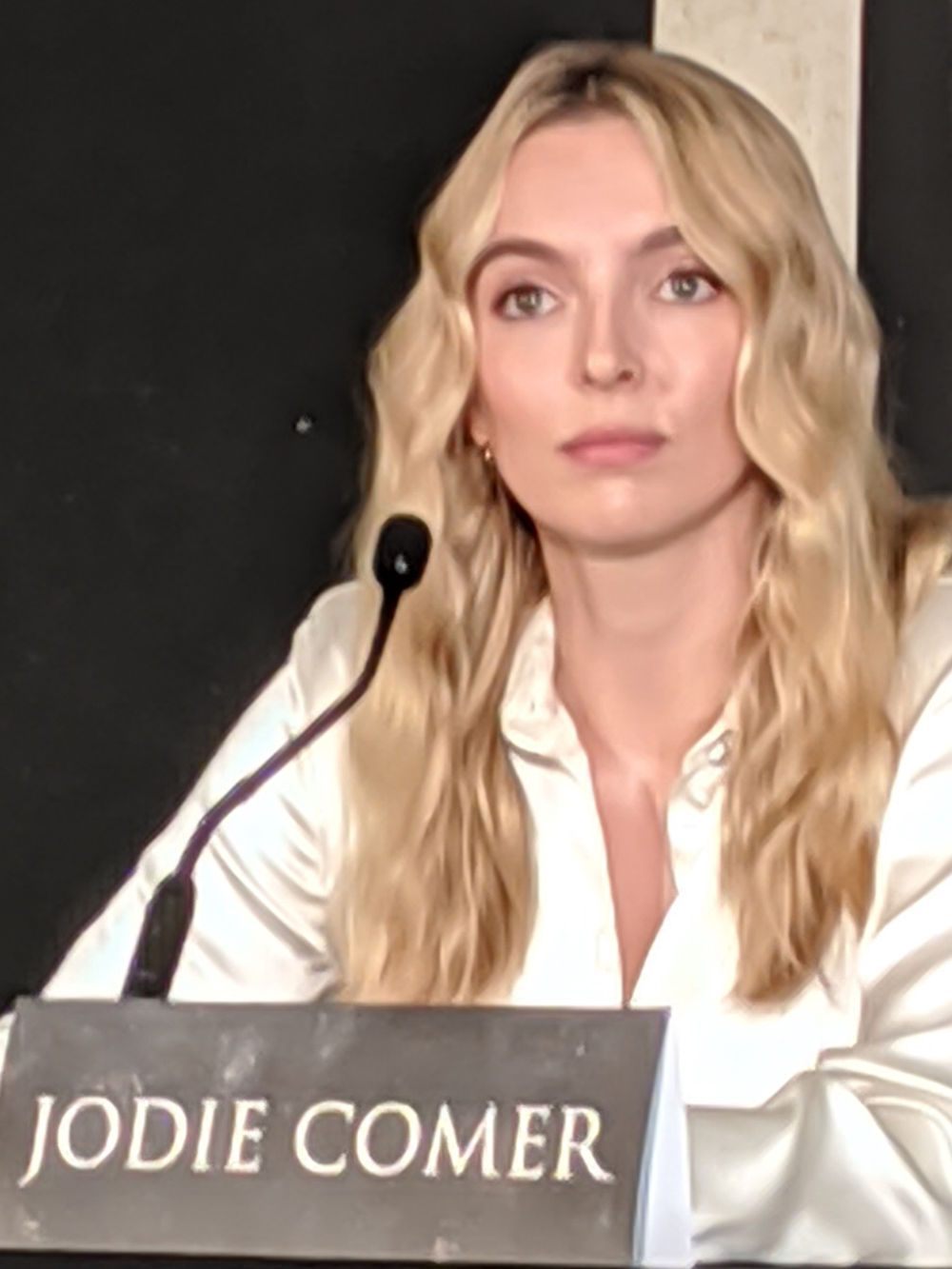
A medieval epic film inspired by true events, The Last Duel is a gripping story of betrayal and revenge set in France in the midst of the Hundred Years' War. It explores the omnipresent power of men, the fragility of justice and the strength and courage of a woman determined to make the truth triumph. The film reveals ancient hypotheses about the last known judicial duel in France - also known as the "Judgment of God" - between Jean de Carrouges and Jacques Le Gris, two friends who became bitter rivals over time. Carrouges is a respected knight, known for his bravery and skill on the battlefield. Le Gris is a Norman squire whose intelligence and eloquence make him one of the most admired nobles at court. When Marguerite, Carrouges' wife, is violently assaulted by Le Gris - an accusation that he denies - she refuses to remain silent, not hesitating to denounce her assailant and impose herself in an act of bravery and defiance that puts her life in danger. The ensuing battle - a grueling duel to the death - places the destiny of all in God's hands...
The director Ridley Scott, the actress Jodie Corner and the screenwriter Nicole Holofcener were present at the Paris Press conference.
Q : hello to all three of you. Thank you so much for being with us here in Paris today. Welcome to all of you. Just a first question what does it feel like to be presenting the film here just a stone's throw from where these actual events happened so many centuries ago.
Jodie Comer : i mean, i just feel like it makes it all the more special and you know such a magical evening and to be able to kind of be here in its presence it's wonderful i feel very lucky to be here
Nicole Holofcener : and to see you know Notre Dame which we created in the movie being built and it's like oh we're here and the way Paris looks in the movie which is so you know different. it's really wonderful to come see it's so beautiful.
Q : my question is in two parts actually the first part is mostly for the writers. Didn't you seem to be afraid to lose people by showing the part two and part three being very similar and the second part of the question is for also you Jodie Corner actually how was it to play twice an assault scene ?
Nicole Holofcener : well very, you know we wanted both assaults to be similar enough but quite different so that we know that there's nothing in it for Marguerite. She's clearly being raped in the third one and you know we struggled do we have to show it twice do we have to show it twice and how long should it be but it was imperative to show it twice because we had to show Le Gris point of view and is that's your question right pretty much.
Ridley Scott : i mean it's also, it's important that it's from Le Gris point of view it feels the same. He doesn't see it any different correct that's what's important
Jodie Comer : i think for me that's what I was really drawn to in the script which i thought was really intelligent was the fact that there was no dialogue change it all had to be shown through emotions and performance and so you know that meant a lot of conversations as a group and talking about what it was that we wanted to achieve and express and you know because those shifts are so nuanced and they are very slight. Like as an actress it was an extremely playful part you know it was it was great to be able to find freedom in in trying various different things at times it was slightly confusing because you usually come to a project knowing your own intentions and your own motives never having to lean into the other character's expectations of you so yeah it was interesting.
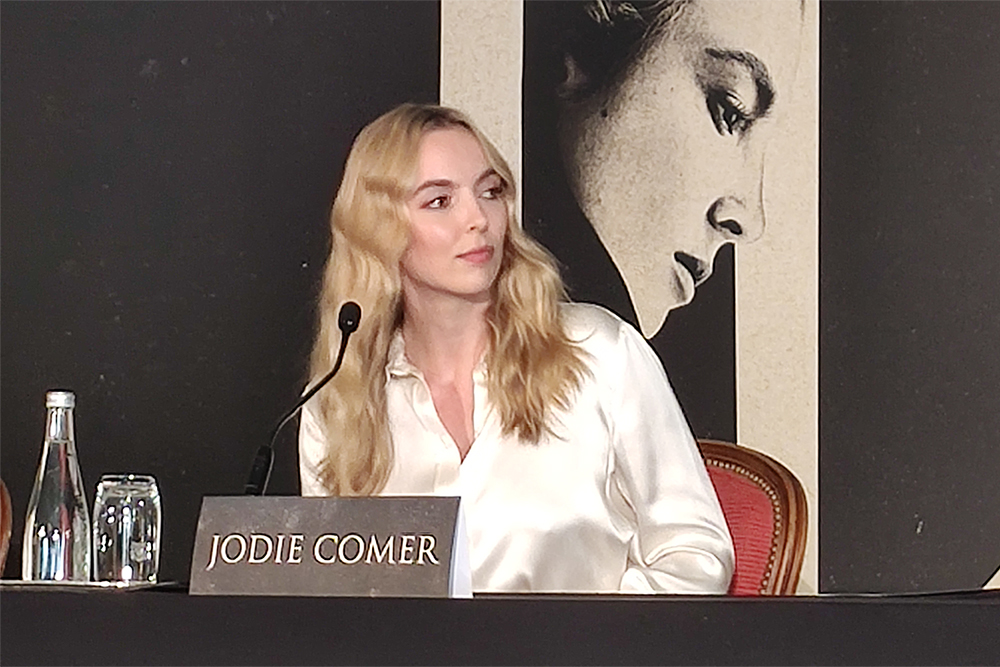
Q : okay so the question is obviously this movie stirs up a lot of themes that are still very current today whether we're talking about anti-Semitism homophobia violence against women. Are you all optimistic for the future or pessimistic for the future ?
Ridley Scott : I Really think you have to take a bit of optimism when there's so much pessimism around. I think it's is it moving i think very slowly but not quickly enough and so when we make a movie like this it's a helpful process that's part of the reason to make the movie
Nicole Holofcener : you know but i feel like this movie could have been obviously been made you know 20 years ago when the #Metoo movement was not so present or didn't exist and it would still be sending the same message. it's like we didn't sit down to write it because it's relevant today. We wrote it because it was a really good story that's relevant you know always
Ridley Scott : but it can take place in across the world in any way it's actually universal.
Jodie Comer i think as well that's the kind of power of making a film that you know tackles something that is uncomfortable and extremely sensitive is that i know from people within my own kind of circle who watched it together whilst watching it have conversations have been starting so it does you know it does start those conversations which i think i think is a good thing.
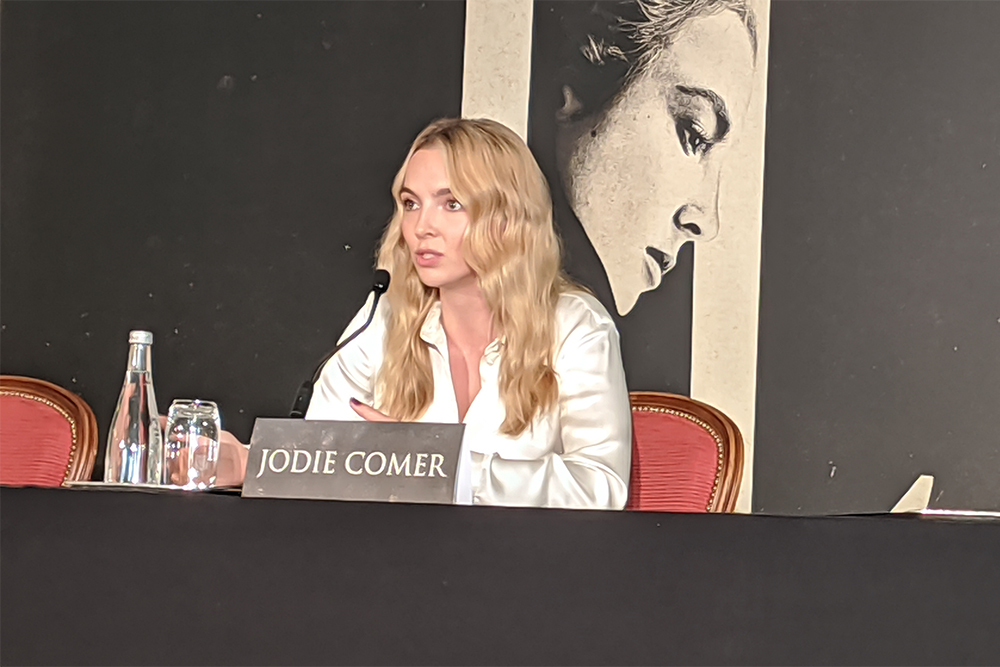
Q : Jodie what was it like for you on the set shooting those scenes which are quite intimate and aggressive at times how do you prepare yourself for that ?
Jodie Comer : i mean honestly they were extremely safe. i felt strangely relaxed because i knew i was in safe hands with Ridley and the team you know i knew that everybody knew how sensitive this was and how it needed to be handled for the duty of care. Adam and i had a lot of respect for each other so a lot of we didn't really speak an awful lot about it however i remember in regards to the rape scenes the evening before Adam and i went to set and we went on to the set in the studio with Ridley and we blocked out those scenes and just the physicality no emotion no dialogue just to see where the placements were and then the next day we got to set the cameras were ready. i think we did about three takes in total and i have to say you know massive respect to Ridley. I remember when we did the first take and he immediately told everybody to drop their tools and leave the room and we were afforded you know five ten minutes just to settle and talk about what we'd discovered if there was anything we wanted to kind of explore more or change so it was a very respectful step to be on
Q : We were you interested in this movie with in the fact that it was really the end of an era the end of this sort of barbaric type of duel was that what interested you the most in the movie ?
Ridley Scott : no Julian went on for centuries i made a film in Napoleonic time where these two guys do together for 30 years trying to keep each other up the whole basis of the duel the duelist was based on two people called Fournier and Dupont you know when i went to the village to decide to make the movie which is in Salah which is where we made the film i have to go to the Mairy and i have to give the Mary a script for him to approve that i can shoot in the area and he looked at the scripture but this is of two local men who became general that became colonels he said one was called Dupont and Funia and then the script it was called Dubai and pharaoh was originally going to be a large grand book about Napoleonic wars by that great author so in fact it was a local story and does that answer the question.
Q : not so much the end of duels the end of this era that was heading into the Louis the eleventh era was there something about a transitional period
Ridley Scott : no i think people dueled for centuries dude they never stopped they weren't illegal or funding but they just kept human right
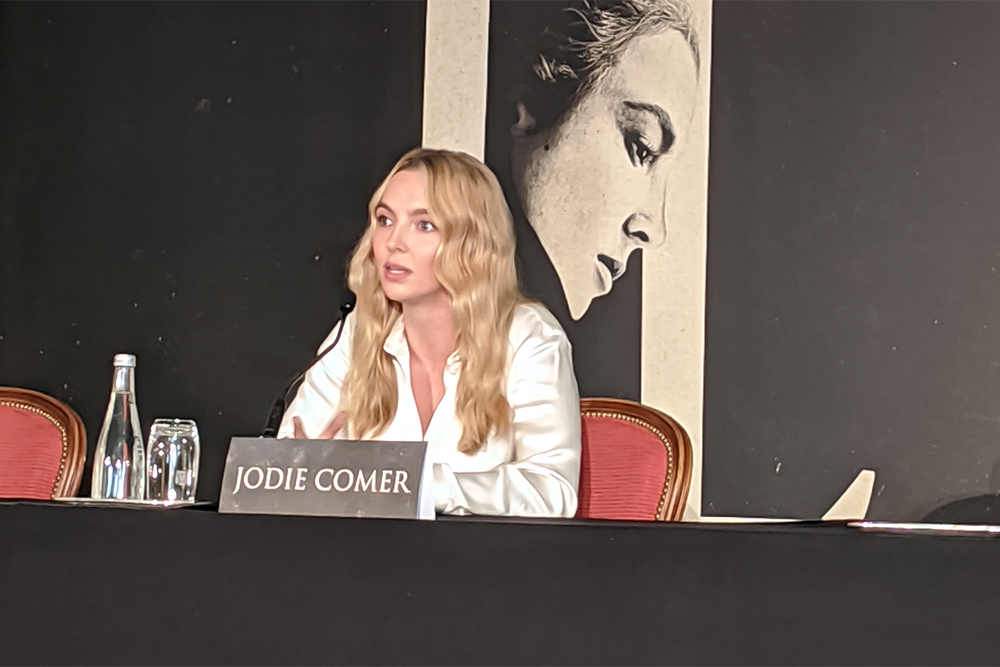
Q : so for you it wasn't as if it was a transitional time at all listen
Ridley Scott : it carries on in the wild west into America they're always dueling and having gunfights. it's been forever the only unique thing about this was that it was regarded as illegal you have to go to the king to ask him if we are allowed to duel with public in public combat due to the death but there's a lot of hundreds of thousands of private Jews in the next 300 years
Q : and my question would be for miss Corner. the film is divided in three parts and during the first two your character is seen through men eyes somewhat male gaze and during the third part the fintech's you your character lady Marguerite feminine perspective and point of view and i was wondering how was that it almost seemed like three complete different parts to play and i was wondering how was that challenging in your way of working the part and was there a more challenging chapter to act for you .
Jodie Comer : that's a good question. i think generally there wasn't a particular chapter that was most difficult. i think the probably most challenging part was that we shot those versions simultaneously so for instance we'd be in the gris's story and then really go right now we're in courage so then i had to figure get my brain in order and figure out what that was.
Nicole Holofcener : it's like do you do I hate my husband
Jodie Comer : yeah or do i like my husband or you know i'm playing i love him but i'm like i hate this guy so it's like a contradiction but you know we would always just kind of have a conversation before each take and just make sure that everybody was on the same page.
Q Nicole talk to us a bit about the writing of these three parts and i mean we've seen in the press kit that part of the reason you said well you were brought on was because of your female gaze your female voice but there obviously is more to it. How did you go about making this third part for Marguerite the way it is
Nicole Holofcener : from the book and from research that i did as well as i mean the book by Eric Jager is pretty detailed less so in Marguerite's case. So with research and my imagination which often was struck down because it was wrong you know figuring out like what she might be thinking and what kind of things she might be doing and that we all wanted to make her very capable maybe even more capable than her husband is and taking care of the land and the home and you know i wrote mostly her part and then but at some point Matt and Ben and i were just collaborating and i don't remember which you know which is what i mean i did much less writing in their two sequences than they did in Marguerite's but it all had to track so we worked together it was really fun.
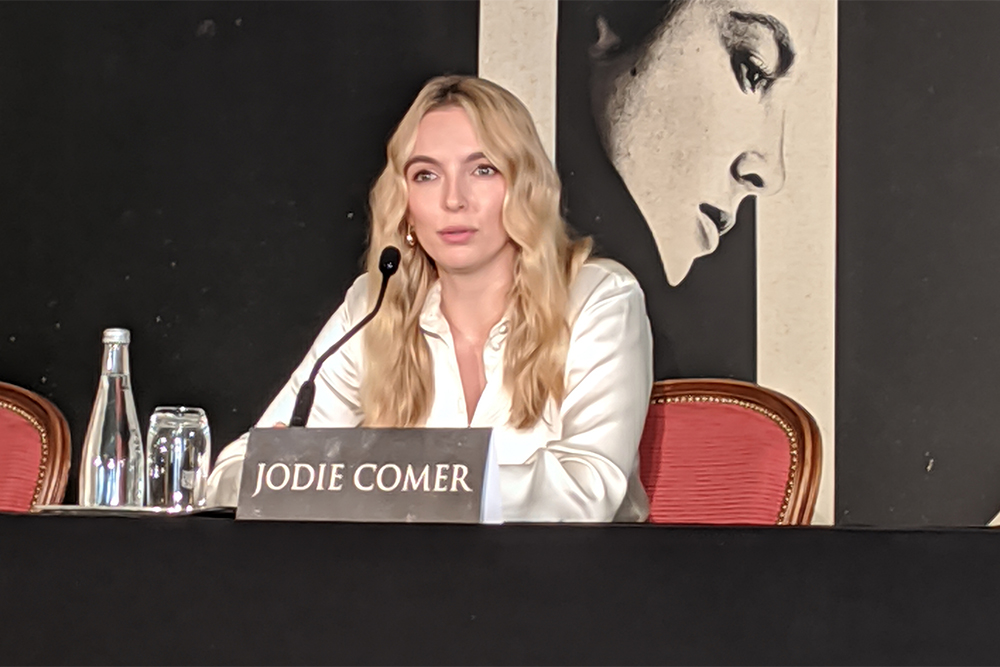
Q : hello it is a question for Jodie Comer and Nicole Holofcener. i wanted to know what was so special about Adam Driver as an actor like you almost answered right before but what makes him such a special actor today
Jodie Comer : i think for me he's incredibly spontaneous and he has very little fear. So you never know what you're going to get from Adam which is great because it's there's like an energy that's constantly fizzing and i actually when he's very charismatic which i think is what works so brilliantly with l agree because even when i watch the film for the first time i was like wow i kind of like this guy you know like it really threw me watching Adam and Ben and the chemistry that they had on screen i thought was just phenomenal. So yeah i'm a big Adam fan if you didn't know
Nicole Holofcener : all you needed to see him smile . have you seen him smile [Laughter]. it's pretty miraculous but Ridley cast him so really might want to say something.
Ridley Scott : no i think my biggest investment when i prepare anything is normally you have to cast everybody but in this instance i was cast by the two writers that in fact Matt called me first said you want to do this you've already done the duelist do you want to do another one in simple terms and he it evolved he talked to me about what it was and how would i turn down Matt and Ben so everything after my job then is to cast the movie and so everybody right down to the window cleaner from the groundless to the smallest and my investment is everyone is important and so i take a lot of time casting who it's going to be because I want to know how particularly the leading people not just technically good they are but how invented they are because i'm always looking to be thrown my biggest compliment with any actor when i sit down things Jesus Christ i never thought of that one that's brilliant that's my highest athlete i can give anyone i love to be surprised .
Q : it's a question for Ridley Scott. you have because of Covid everything was delayed of course and now you have a couple of films that are coming out almost simultaneously in an industry where the box office is not really back to normal and so on so I wanted to know what were your hopes and fears for these two films and if it is problematic to do the promotion of them both at the same time.
Ridley Scott : well you've got to remember i did both of them in under two years so that's my speed that's the way i work my pattern is once I’m in the filming process and I’m approaching the end i always you can only do this with a great editor and i have probably the best editor in the business and i let her edit as i go so when i go in and see rushes at night she'll say you want to see a scene so yeah let me see so by the time we finished i saidwrap we see a director's cut within three weeks normally it takes Martin Scorsese a year and something else it'll take 14 weeks so i see it immediately and from that i'm already preparing the next movie so i'm already into prep and post that's the way i work because it keeps you fresh and there's a moment you know it's a bit like writing there's a lot where you write and then you put it down and then you read it again in six weeks and go oh my god that that that crap and so when i'm directing something I step clear when i'm mixing something I step back so when they say you want to see something i know every foot every frame i'm going to go ah that that that and that because suddenly you're very you're distilled you're out of it and therefore you can give a very clean opinion but this selling it listen when you get two great pieces of material like this i already don't care .
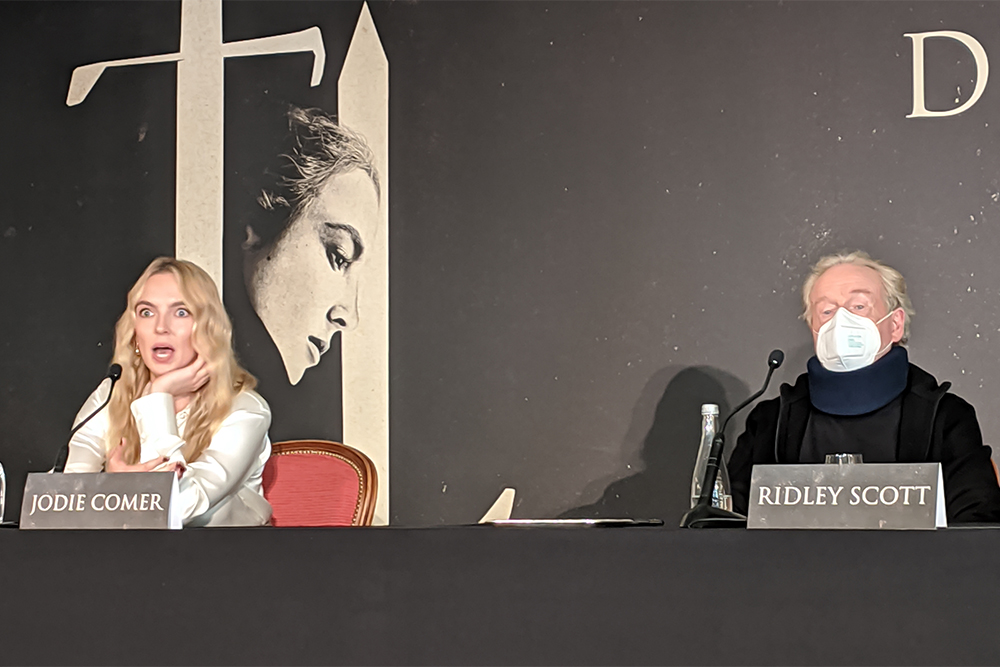
Q : so she's saying why in the three chapters you first have the truth according De Carrouges and the truth according to Le Gris, she's wondering why you chose for the third chapter to have it remain saying just the truth
Ridley Scott : this changed gear many times is the chapter is it the story is it this is that and i think in it it enabled us to underline that this was deliberate it was a deliberate choice what we were doing so you're having three different points of view therefore it seemed why not because on the surfaces complex just have a heading it's kind of elegant and it instructs you what it is
Nicole Holofcener : but the way it fades out you know the title to just say the truth. I think it's brilliant when i saw it isjust gave me the chills did not do the titles
Q : Did you write it that way Nicole thinking that this was the truth
Nicole Holofcener : absolutely i mean we never had any doubt that we never thought she was ever lying and so you know we also because of that title and it you know it dissolves into just the truth we wanted to make it very clear this is not a movie you come out of going who do you think was right it's like no we know what happened and we know who's wrong
Ridley Scott : but importantly there's a very good actor who plays the lawyer that will agree and we added that line late where he says how would this woman have actually put this case up if it weren't the truth because what she stands to suffer is burning how it so it has to be the truth it's almost a silly question of course it's the truth why would she risk such you know his fortune .
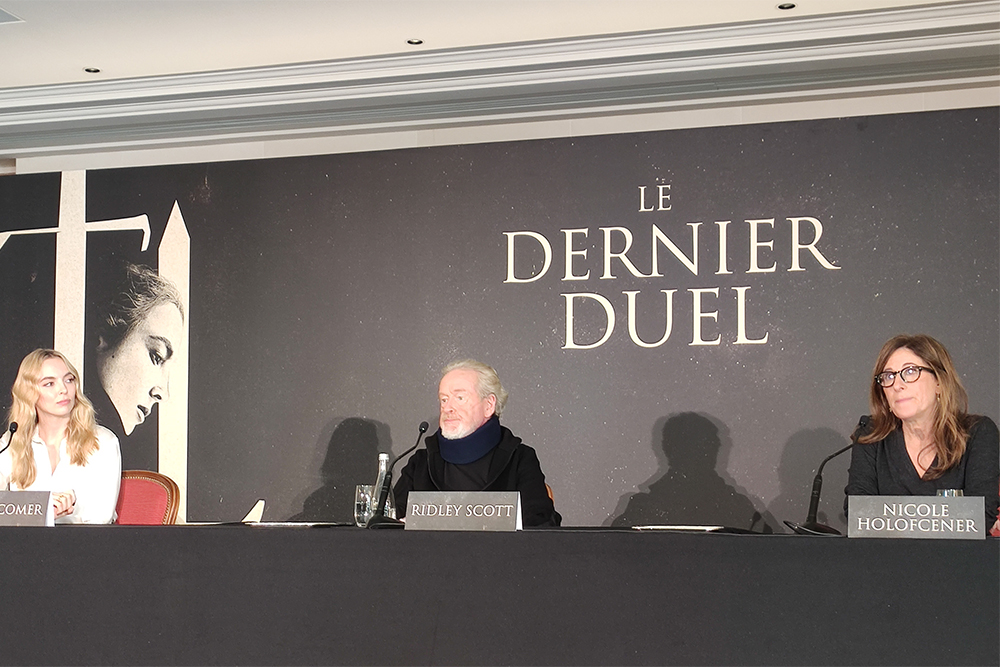
Q your first film was a Duelist and the last one the new one is the last Duel what is your particular interest in Duel ?
Ridley Scott : that's what i do for a living and so if you don't embrace stress don't do my job but I kind of like stress that keeps me going and you know the duelist when i saw the Mary and i hear something funny about France i hope you have a sense of humor go for it the Mary said i said you're making a film here yes i hadn't met him so i was i'm not you said is sex film i said that it says Brigitte Bardot i said no he says Michael Winner i said no he said good i'll read .
Q : it is it really is that why you decided to shoot down on the south of France instead of in Normandy because of your good experience from so many years ago
Ridley Scott : by the time i did a film i'm 40 years old before you make my first movie and because i'm so successful in advertising when you're successful and making money you forget about anything else and i would realize at 38 my god i'm never going to make a movie and so i knew every part of France every part of you could every part of middle east forest because i went everywhere with commercial so when i was reading the novel which was turning into a screenplay i could only think of that part of France which interestingly since i was there maybe four years ago it's actually improved the whole area is quite spectacular when i was there 40 years ago i was concerned it was going to go off the thing with wires and cables and building but actually they've recouped it they've really protected are very impressive.
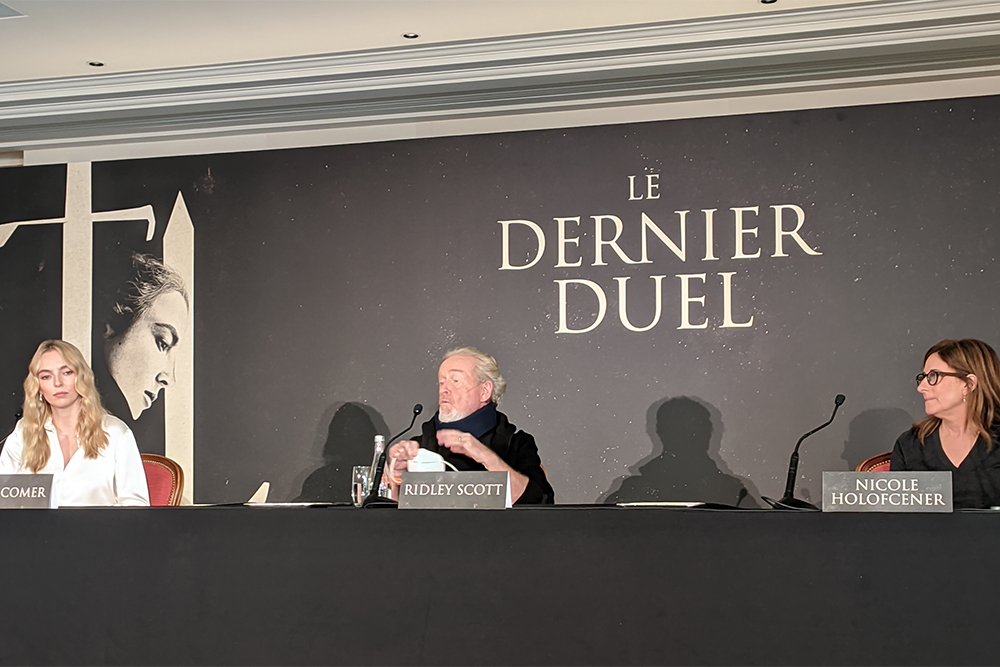
Q : so just for you Jodie what how do you look at the character of Marguerite how would you describe her what do you think of her ?
Jodie Comer : : oh my gosh well i came away from playing her feeling incredibly empowered you know just to second what Nicole said when i was kind of doing my research into the history at the time for instance one piece of information was that you know this was essentially a crime against the man this wasn't it this was a crime against her husband it wasn't a crime against her and often the man would be compensated with money for the embarrassment that his wife had caused him and then when you know that her life was at stake by speaking out in the way that she did, i think she's remarkable you know um the strength that she has and i loved especially in regards to the film how you know she has this experience but it isn't defined by her and you see her at the end of the film and she's with her child and she loves that child and you know and she goes on to live and i really love that and i love the opportunity to work so closely with Nicole and really try and find out who she was and get a sense of her personality and you know i really i really love that.
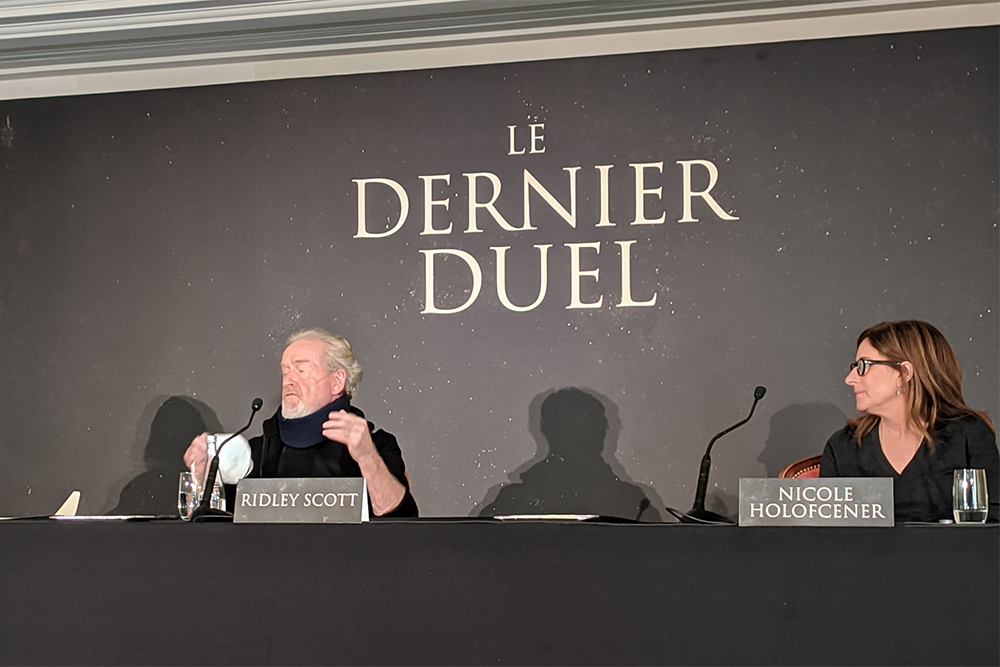
Q : hello my questions for you three about the part two when i saw it i saw a rape already not only the third part so i wanted to know how you saw it when you wrote it when you acted it was it for you clearly a rape even if it's not as brutal as in the third part ?
Nicole Holofcener : they're both rapes although Jodie is directed by you too there's a sort of it
Ridley Scott : that's three there's two it's not three points of view the third point of view really is the husband's jealousy the first two points are very distinct very specific and therefore it was seen could have been seen to Adam Driver's eyes because he whichever version he felt she was compliant and enjoying what was happening so that was that's what was important
Jodie Comer : i think it's also interesting as well and i know you've spoken about this really before would you what I might touch on more than i do but when you see how he navigates within his own world and the women who surround him and you see you know the orgies and how they how women act around them and you get a sense of that was normal but you get a sense of what this guy thinks is deserved and happens and so when you were in his perspective you know i feel like all those seeds were kind of planted earlier on but I think that both of them all you know definitely raped like without
Nicole Holofcener : i love the line and i don't think i wrote it so i can’t say but Adam Driver at one point says well of course she protested she's a lady she's like what ..
Ridley Scott : even Pierre who frowns at that comment he was like okay that's that line gives a mix and gives him a lot of trouble people missing also is that and i shouldn't be saying this but i've read it seen it heard it that one of the worst conditions and decisions for a woman who has been raped is to admit she was raped because the assumption might be that she was compliant and it wasn't great and that is centuries old it goes right through till today you know there's four so rape happens every four and a half minutes globally you know absolutely shocking.
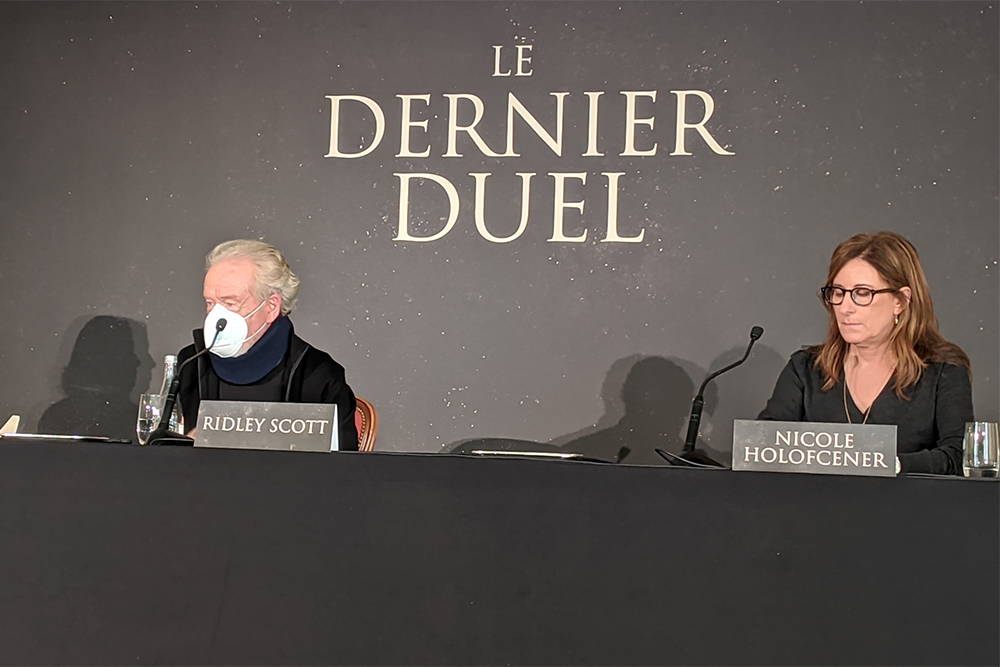
Q : Can you tell us really about the research in your work and how precise the creating that world of 1386 was ?
Ridley Scott : don't do shit. i just open books and i draw pictures like a child with crayons. i don't research anything so what then you're reading the moment nothing i just go and i do this film. i was a great art director and i was trained as an art director I went to probably the best film art school in England at that point was a funny little school up in the in Durham called West Hartlepool Colorado four years from there i went to the world college of art as with Kitaj Hockney et cetera so this is amazing era and those seven years i use every day of my life now so every film i do right now i will draw the storyboard so storyboard for napoleon's this thing or black opt down okay because what i'm doing before i've seen the locations is before locations i'm filming on paper going from the text and the text to me is speaks to me so i'm seeing the dynamics in the geometry of protection so that frequently my boards are there be used to find the store the location so it's kind of in English we call it boss about face but it's a good expression
Nicole Holofcener : : they're not storyboards they're paintings
Q : Were you trying with this movie as well to really show three typical archetypes of that period at Marguerite de Carrougesas the honorable knight the Gris is sort of the greatest.
Ridley Scott : I was trying to show rock and roll 1362. To me you know the duelist is a western i could take the Duels and remake as the western because the fundamental baseline is at the end the last scene they cannot remember what the original argument was about you can apply that to almost every country today interesting so it's a good philosophical baseline and i think that's this in a funny kind of way. How can you say anything's more important than that violence and global warfare but this is equally important that's what attracted me the challenge of actually doing this and keeping it in balance and telling having a good chronicle of what happened.
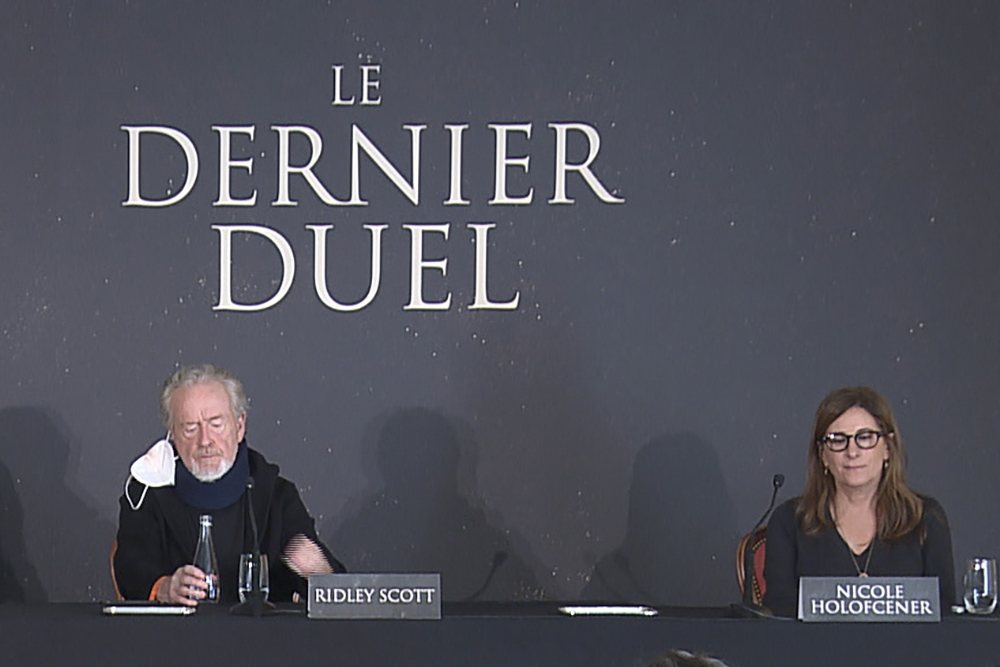
Synopsis:
Based on true events, the film uncovers ancient speculation about the last known judicial duel in France - also known as the "Judgment of God" - between Jean de Carrouges and Jacques Le Gris, two friends who became bitter rivals over time. Carrouges is a respected knight, known for his bravery and skill on the battlefield. Le Gris is a Norman squire whose intelligence and eloquence make him one of the most admired nobles at court. When Carrouges' wife Marguerite is violently assaulted by Le Gris - an accusation he denies - she refuses to remain silent, not hesitating to denounce her assailant and impose herself in an act of bravery and defiance that puts her life at risk. The ensuing showdown - a grueling duel to the death - places the destiny of each of them in the hands of God.
The Last Duel
Directed by Ridley Scott
Screenplay by Nicole Holofcener, Ben Affleck, Matt Damon
Based on The Last Duel: A True Story of Trial by Combat in Medieval France by Eric Jager
Produced by Ridley Scott, Kevin J. Walsh, Jennifer Fox, Nicole Holofcener, Matt Damon, Ben Affleck
Starring Matt Damon, Adam Driver, Jodie Comer, Ben Affleck
Cinematography : Dariusz Wolski
Edited by Claire Simpson
Music by Harry Gregson-Williams
Production companies : Scott Free Productions, Pearl Street Films, TSG Entertainment
Distributed by 20th Century Studios (United States), Walt Disney Company France (France)
Release date : September 10, 2021 (Venice), October 15, 2021 (United States), October 13, 2021 (France)
Running time : 152 minutes
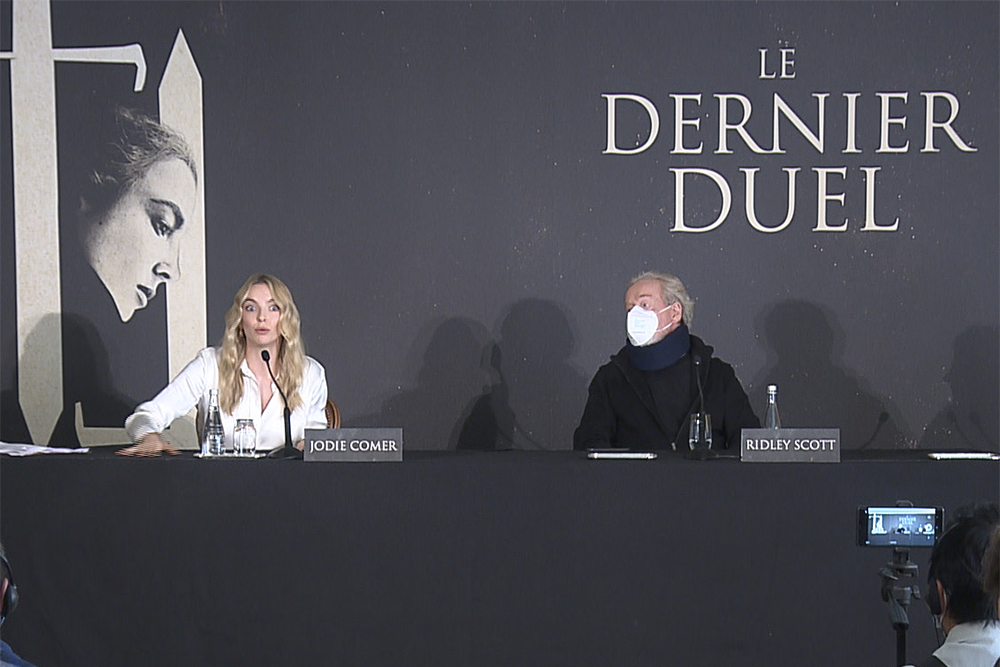
Photos : Juliette Roche / Mulderville

